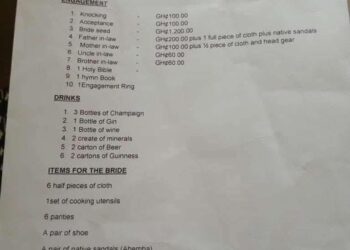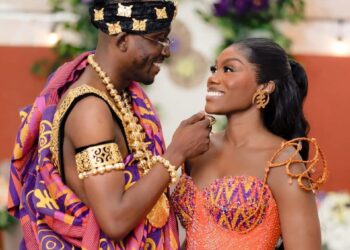In a previous post, we talked about the expenses a groom and his family should cover. Today, we discuss the wedding expenses a bride pays for. When it comes to wedding planning, understanding traditional expectations is important, especially regarding who pays for what.
In most Ghanaian cultures, the bride and her family traditionally covers certain significant expenses, especially for the reception. However, over time, these responsibilities have evolved, with some shifting towards the groom. Let’s explore the traditional financial responsibilities of the bride and her family, focusing on Ghanaian norms and traditions.
Traditional Wedding Expenses of the Bride.
In Ghana, when it comes to the traditional wedding, the reception is primarily the responsibility of the bride and her family. This tradition stems from the idea that the groom, his family, and friends are visiting to marry the bride, thereby making them guests of the bride’s family. Therefore, the bride’s family typically sponsors the following:
- Reception Venue: The bride’s family is responsible for the venue where they will be receiving the groom and people and that’s normally the exact spot, the traditional wedding ceremony popularly known as engagement takes place. It can at the bride’s family home or a rented space.
- Food and Beverages: The bride’s family provides the food and drinks for the reception, ensuring that all guests, including the groom’s family and friends, are well-fed.
- Accommodation and Transportation: If necessary, the bride’s family might also arrange accommodation and transport for out-of-town guests.
- Gifts for the groom’s family: Normally, gifts are given to the groom’s parents and close family members who attended the ceremony as a gesture of appreciation. Small gifts or souvenirs(for made in Ghana souvenirs) can also be given out to the guests in attendance.
White Wedding Expenses.
The concept of a “white wedding,” which involves a formal ceremony often held in a church followed by a reception, has its roots in Western culture. Traditionally, the bride’s father would pay for the wedding, covering most expenses related to the ceremony and reception. However, modern couples often choose to share these expenses or pay for them independently.
5. Wedding Dress and Accessories: The wedding gown is often one of the most significant expenses a bride pays for. Not forgetting to include all accessories like veil, jewelry, shoes, etc. that completes her looks. Also, consider alterations and preservation costs.
6. Hair and Makeup: Professional services for the bride, bridesmaids, and possibly mothers of the couple.
7. Groom’s Ring: Often purchased by the bride as a token of her love, this expense should be included in her budget.
8.Bridal Party Gifts: These are tokens of appreciation for the bridesmaids. It’s customary and these gifts can anything from the bride’s heart ranging from personalized to practical items.
HELPFUL GUIDES TO PLAN YOUR WEDDING.
- Long Bridesmaid Dress Styles : Stunning Inspirations for Every Wedding.
- Eye-Catching Wedding Guest Dress Styles to Wear This Year.
- The Ladies Who Brought Their A-Game to #TGMA2024(Wedding Guest Inspo).
Proper planning and budgeting can make wedding expenses manageable. It is important for intending couples to have open conversations with themselves and families in order prioritize expenses. This can helpful in navigating through the journey to this special occasion.









